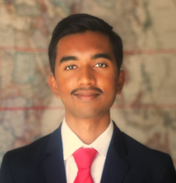Ruvimbo Samanga is a graduate in Trade and Investment Law, currently specializing in space law and policy research for the African and global space sector. She has been recognized as an African Space Leader, an Emerging Space Leader and a Young Space Leader for her contributions in policy, business, education and outreach, and looks to collaborate on space-related, capacity building research for the African and the global space sector.
You represented Zimbabwe on the Space Generation Advisory Council, which seeks to bring about the next generation of space leaders. Why is it important for Zimbabwe to be a part of this movement?
I think it's important from a policy development standpoint and from a sustainable development standpoint as well. Starting with the former, our government has made it very clear through various policy protocols that ushering the country into the next tech revolution, or the fourth industrial revolution, is a priority. These policies include, for instance, the Education 5.0 plan, [which] is centered on [a] heritage-based philosophy and [is] shaping future technology through innovation and industrialization. This is also contributing to our broader industrial agenda, which is to become a middle-income country by the year 2030, and we understand that STEM and also space-based applications will play a very huge role in that capacity in the years to come.
From a sustainable development point of view, I think it's important [for Zimbabwe to be a part of the movement] because it's very clear that Africa has a host of developmental challenges, and Zimbabwe is no different. Even with regards to the space agency, which was an initiative flowing from broader industrial policy, we will be tackling sustainable development issues in farming, mineral exploration, wildlife conservation, infrastructure management, and disease surveillance. So in a nutshell, it's important for Zimbabwe to be a part of this because it's a rapidly growing industry; it's a very impactful industry; and it's an efficient and effective way to support sustainable development and policy development in Zimbabwe.
In 2019, you launched a service called AgriSpace to connect farmers with aerial data, including satellite data, in order to help them make smarter agricultural decisions. How do you see innovations like these transforming the global agricultural industry, especially in countries where farmers form the backbone of the economy?
And indeed, they do. I think it's important to note the broader context, which is that Africa will have the largest population [growth through] 2050, and our population is expected to double to over 2 billion people by that year. This means that not only do we have a capacity for food insecurity, but we also have capacity for innovation and development because 60 percent of our population is under the age of 25, which means our future is very much young, energetic, creative, and enthusiastic. If you look at the agritech arena, as it stands, there are about 40 agritech startups on the African continent. One might say that this is a saturated field, but I think what it highlights is the need for this kind of innovation, that there's a demand for it. [So] I believe that [the industry] will play a huge role not only in sustaining African livelihoods, but world livelihoods as well. Of the over 280 Earth observation companies currently operating on the continent, many of them were founded by individuals younger than 35. I [thus] believe that much of the sustainable development initiatives that we will see in the next few years will be youth-based. And I think this is a clarion call to governments to not only invest in youth, but [also] recognize the potential that the youth have in providing these innovative solutions.
For instance, the unique selling point of AgriSpace, and many other [similar] companies as well, is that there's more emphasis on collaboration as opposed to competition. What we mean by this is that Africa has developed a regional approach to space development, and I believe the agritech [realm] will not be any different. I believe there is a coming together of stakeholders to create what will be the first comprehensive agricultural data map for Africa, which will map different agro-ecological zones, and we currently do not have that. It will be interesting to see how different stakeholders—whether it is [the] private sector, academia, or government—will come together to create crowdsourced data platforms that are more robust and more comprehensive, because I think that is the only way we will make a tangible impact. Whereas with other jurisdictions, I believe it's a very unitary approach where each stakeholder is developing their own data according to their own standards and for their own purposes. I really see a unique approach in Africa where there's a need to come together to serve cross-sectoral needs.
Last year, Zimbabwe announced that it would launch its first satellite to gain insight into climate and land cover issues. What direction do you see Zimbabwe’s space program going in the near future?
I certainly get the inkling that we are positioning ourselves to be a tech manufacturing hub, and I say this in line with various directives that have been given by the government. One of them includes the development of tech hubs, innovation hubs, and technological parks. The first [hub] was actually launched in collaboration with the National Space Agency, and it is housed at the University of Zimbabwe. In partnership with the Ministry of Higher and Tertiary Education, the Zimbabwe National Geospatial and Space Agency (ZINGSA) was launched as a pilot program [with] the Zimbabwean university [system] to provide a sort of academic and research and development backbone to the development of this program. I think that we certainly want to involve ourselves in Earth observation because of the sustainable development impact that it has, but I also see us moving into other areas as well of interest, such as wildlife: Zimbabwe has a very thriving wildlife population, which [is spread] across four other countries as well, and the interaction between humans and wildlife is quite unsettling. So we certainly have that public need as well. I also see us moving into disease surveillance. We have airborne diseases which are affecting great [numbers of people] in Zimbabwe, such as malaria. These are all preventable and treatable, so I certainly see them as one of our core priorities.
Last but not least, the biggest priority, I think, is agriculture. One of the current programs, a geospatial capabilities program, has actually been awarded a US$10 million grant by the Ministry of Finance, which is specifically aimed at mapping what we call A1 and A2 farms, which are small- to large-scale farms, through satellite imagery for the issuance of leases and permits in Zimbabwe. So certainly, that's something to look out for. Satellite development, as well, is going to be quite an interesting field. We know that the first CubeSat, ZIMSAT-1, will be launched perhaps sometime this year. Following that, there also is a desire to launch [more] Earth observation satellites, navigation satellites, and telecommunications satellites to support broadband, [since] Internet penetration stands at about 40 percent generally across the African region. So, there is a need to build [those] capabilities.
Do you see the rapid growth in African nations' space programs as being motivated by economic needs, geopolitical strategy, both, or something else?
I think at the core, it would be economic needs, but we also can't understate the potential of geopolitical strategy. I’ll start with the former. It's no secret that Africa has a deep need for space-based infrastructure. A number of space programs have all decided or have the intention to use space for sustainable development. So technology and innovation, while they are very noble ideals, [are] not Africa's current focus. What is the current focus, though, is new satellites, predominantly in the Earth observation, telecommunications, and navigation spaces. These are the three core satellite usages that we see on the continent. To give a few facts to show how rapidly it is growing and to demonstrate the need, by 2025, we will have at least 114 new satellites. 10 countries are currently developing their first satellite, and new opportunities to launch satellites are also arising, whereby Africa not only wants to be able to launch satellites, they [also] want to be able to launch satellites from home terrain. So that kind of significant infrastructure development is indicative of a need to develop our own means of accessing this valuable resource. We have at least 19 space agencies, and of course, we continue to see massive investment. In 2021 alone, the budget for all space agencies across the continent was US$548 million, which in the grand scheme of other space programs might not seem like a lot, but it's a 9 percent increase from 2020 and a 94 percent increase from 2018. Political will is often a challenge in Africa, where there's so much ambition, but when you can see significant investment in an economic sector, I think it's indicative of the need for that development.
[As for] geopolitical strategy, we have a variety of partners on the continent. Our biggest partner is Europe, followed by China and isolated instances of partnerships with Russia, Italy, and France. We do not currently have satellite-based partnerships with the US; however, the US did sign a partnership agreement with the South African National Space Agency (SANSA) to host a deep space exploration station.
Geopolitics will always be an underlying factor when it comes to international partnerships. For instance, the trend with China-based investments is that [they are] usually linked to some form of infrastructural development. So there is a contract to develop and manufacture satellites to be used for infrastructure monitoring, or marine and coastal services, for instance. It's never in isolation; it's always with a broader developmental impact, and that's a geopolitical concern because it opens up questions of national security and national sovereignty over data. We have to consider all of these. You also have other policies which [focus on] capacity-building; China has committed to educating about 300 Africans in the next few years through scholarships and grants. But again, with the history of Africa and external aid, there's always undertones of the democratic and political climate that you also have to consider, which will [pose] a geopolitical concern and is perhaps the reason why certain jurisdictions have not ventured to invest in Africa. So there's the need to firstly [address] our own challenges, but there's also the need to receive help from the international community to allow us to develop local skills.
What value do you see in Zimbabwe or another African nation potentially going beyond satellites, launching a mission to the Moon, Mars, or further in space?
Well, in the course of the 60 years that humankind has been spacefaring, over 2,000 spinoff technologies have been developed. For instance, the MRI scan was developed from space technology, as well as the vacuum cleaner and a host of other things that we use in everyday life, like firemen’s suits. These were all technologies that were created from the testbed of space, which is an extreme environment. And with the rising concerns of climate change and other natural disasters, we will very much find ourselves in these harsh environments soon. What developing or pushing these frontiers does is it opens us up to new technology, new innovation, and new ways of solving problems. One [technology] I particularly like, and that I think will be important for Zimbabwe, is vertically integrated agriculture, using the least amount of resources to develop a crop system that is sustainable, healthy, and viable. These are systems that are currently being tested on the ISS, and if we can harness that technology, we will save water. Water scarcity is already a concern in southern Africa. We will also feed the population and allow ourselves to continue to push the frontiers of tech development.
[In addition], Dr. Adriana Marais, a South African scientist whom I know very well, created an organization called Proudly Human, which is testing offworld settlements exactly for these reasons. So [that] speaks more to the unique challenges that individuals will face in outer space, which mimic, perhaps, [those] here on Earth. For instance, when you're in outer space, and you're experiencing weightlessness and the psychological impact of being isolated from other people, what are the analogous experiments or experiences? Can we equate that to [being] in a natural disaster, or [being] caught up in a terrible war, which we know is happening for many people now? It definitely opens a lot of space for creative interpretation of technology to real-world challenges.
Finally, there's been talk about forming an African space agency much like Europe's. Do you think this is a possibility in the near future, and what is your opinion on such an organization?
It’s certainly difficult to compromise and coordinate on different interests. The European Union is a conglomeration of about 27 countries, whereas with [the African Union], it's [55], so the extent to which there will have to be collaboration is multiplied. What I can say is that plans are ongoing: the financial and the structural framework of the agency has been put in place. I can only hope that plans will continue for 2022. As we know, the host country is going to be Egypt, and the headquarters will be in Cairo. I think that a continental approach will only work from a proactive policy viewpoint [since] much of space industry development has been reactive. This is to say, we usually wait for a challenge to happen, and then we come up with a policy and have to get people to agree. But what I think Africa has a real opportunity to do is show what a proactive public-oriented space program looks like. This has the ability to steer the narrative, because as I mentioned earlier, our goal with our space industry is to foster cooperation, to share resources, and to share the developmental impact of what we're embarking on. What I think will pose a challenge, as always with many organizations, is the matter of cash contribution and the matter of the benefits of space. If these two issues can be overcome, then I don't see any issue with the African Space Agency coming to fruition.
Varada spoke with Samanga on April 3, 2022. This interview has been lightly edited for length and clarity.





